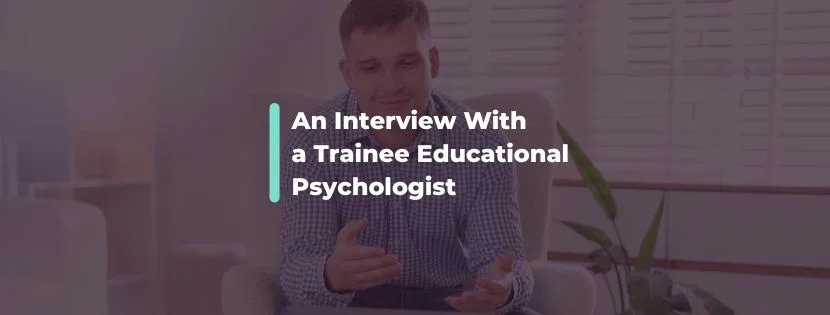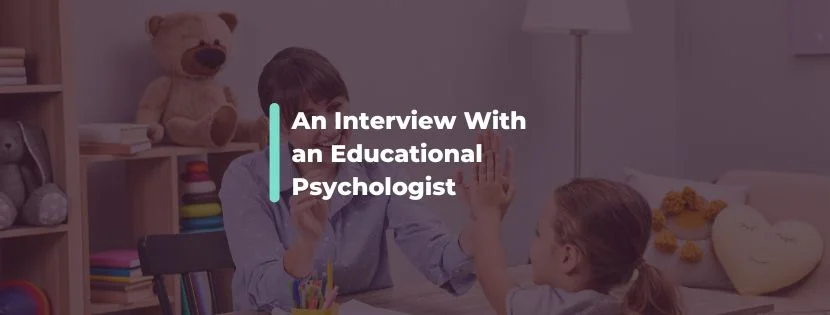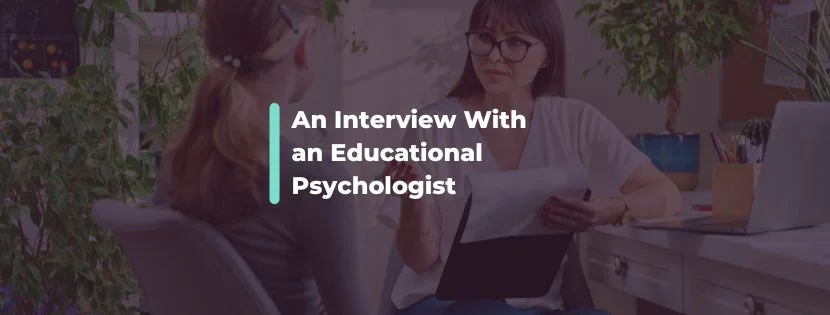Learning the Ropes: An Interview With a Trainee Educational Psychologist
16 Apr, 20241-2 minutes
In this blog, you will learn:
- What it is like to be a trainee Educational Psychologist.
- What to expect in a career in educational psychology.
- Tips to navigate the educational psychology industry and how to tackle stress and common challenges.
- How to find and apply for the best Educational Psychologist jobs.
Thinking about a career in educational psychology but don’t know what to expect? In order to become an Educational Psychologist, individuals must train to develop their skills and learn more about the field. It can be challenging and requires years of rigorous training, education and experience, but the outcome is a rewarding career.
What better way to discover how to become an Educational Psychologist, than advice directly from a trainee in the field?
We recently spoke to a third year trainee Educational and Child Psychologist who has over 20 years experience in the education sector. From beginning his career as a Teacher to working as an Assistant Child and Educational Psychologist supporting the SENCO in a secondary school, David has a lot of experience working with children and young people with SEND.
Despite having three masters degrees, David is working on becoming a qualified Educational Psychologist.
Throughout this interview, David shares his valuable insights on the training process, national shortage of Educational Psychologists and offers tips and advice to overcome challenges.
Tell us about your career journey so far David
I studied geography at university, followed by a Master's degree in international relations. My PhD plans didn’t work out, so I decided to train as a geography Teacher instead. I‘ve enjoyed volunteering with children and young people since I was a teenager, so training as a Teacher seemed like the logical next step!
I worked as a Teacher for 12 years, gaining experience as a Head of Year and department head. In 2017, I decided I needed a change from being in the classroom, so I stepped into full-time pastoral and safeguarding work in schools. This work was challenging but I enjoyed it and had the privilege of working with some fantastic people.
During this time, I also studied for a Master’s degree in psychology. Then in 2021, I successfully applied for a place on an educational psychology doctoral training programme.
When did you realise you wanted to become an Educational Psychologist? What inspired you?
During the last two years of teaching, I realised that I’d become more interested in the issues in young people's lives than in teaching geography. This realisation stemmed from reflections about my experience as a teaching head of year, a role I had enjoyed immensely. This was a significant prompt for me to move into pastoral work full-time.
However, I’m a bit of a nerd, so I realised that for this to be truly fulfilling, my pastoral interests needed to be accompanied by the opportunity to develop my professional and academic expertise.
At this point, I began to think seriously about educational psychology. The psychology Master’s degree allowed me to ‘test’ my interest in psychology and was a necessary step towards applying for the doctorate. Fortunately, as it turned out I enjoyed it!
You're currently training to become an Educational Psychologist, how is your studying going?
The training programme is a three-year professional doctorate programme. I’m presently in the final year of training, so I’m working hard towards completing my thesis and making sure that I have met all the standards of proficiency required by the Health Care Professions Council (HCPC), the regulatory body for all practising Educational Psychologists.
Describe a typical week in the life of a trainee Educational Psychologist?
The programme differs significantly between year one and years two and three. In the first year, I spent 2-3 days a week at university and 1-2 days on placement at a local educational psychology service. Each week, one day is allocated for independent study, to be used for working on assignments.
You spend much more time on placement during the second and third years. The course requires you to spend 130 days working on placement in each of the second and third years. This usually happens with the same educational psychology service across the two years.
I typically spend 3-4 days a week working on placement. There is much less university time in the second and third years, with more time allocated to independent study and research. I currently spend 1-2 days a week working on my thesis.
What does your work consist of?
No day is the same! I have a group of schools that I work with, and each has a quota of allocated time over the academic year. I am responsible for managing this time and organising work with schools directly. This involves assessing children and young people, meeting with families and school staff and producing reports to help schools support any identified areas of need.
I also write reports for the Education Health Care Needs Assessment (EHCNA) process. These reports are legally required to complete Education Health Care Plans (EHCPs). Schools sometimes request training input from Educational Psychologists, which is a time-effective way of supporting schools to be more inclusive and proactive in their work around children's and young people's needs.
I also run various group supervision sessions for school staff in the Emotional Literacy Support Assistant (ELSA) scheme and Designated Safeguarding Leads (DSLs).
What is the most challenging part of your role?
The hardest part of my placement role is managing my time. Coordinating diaries with multiple schools and families always takes longer than expected and requires a lot of planning.
Part of the diary management process is finding enough time to complete required administrative tasks, such as report writing. The mental gear change required between working on placement and working on my thesis can also be quite challenging.
What is the best thing about training to become an Educational Psychologist?
I’ve enjoyed many things about my Educational Psychologist training, including developing new skills and learning more about children and young people.
The variety of work is probably the best thing. I’ve worked in different ways with children from ages 3 to 17 with various needs. They’re all unique and individual, and I enjoy the challenge of learning as much as I can about them in a relatively short space of time. Combine that with my work with school staff, and you have a diverse mix of activities!
I have also enjoyed my research, which has provided me with the opportunity to develop an area of expertise and understanding about a sector relevant to schools and the work of Educational Psychologists.
How do you keep up to date with changes in the industry?
I’m fortunate enough to be part of a great Educational Psychologist team on placement, and they are good at communicating changes occurring within the local authority. The Association of Educational Psychologists (AEP) provides regular information about issues relevant to the profession, which is complemented by other EP-led initiatives such as edpsy and an active X/(formerly Twitter) community (#twittereps).
Research is also regularly disseminated to the profession via journals such as Educational Psychology in Practice.
Why do you think Educational Psychologists are in such high demand?
The answer is quite simple: there aren’t enough Educational Psychologists! The introduction of the Special Educational Needs and Disability (SEND) Code of Practice in 2015 required an Educational Psychologist report as part of the EHCP process.
Due to earlier local government cuts, there was already a shortage of Educational Psychologists available for Local Authorities. Suddenly, Educational Psychologists were in demand due to this statutory role.
Since the COVID-19 pandemic, there has been a national increase in SEND and Social, Emotional, and Mental Health (SEMH) needs in children and young people. Schools are trying to support this emerging growth in needs and want the help of Educational Psychologists to achieve this.
In addition, the requests for EHCPs have increased post-COVID, meaning that Educational Psychologists are in even higher demand.
How do you deal with stress or the pressures of your role?
I have quite a strict morning routine, which works very well for me, although most people respond incredulously when I tell them about it! I usually get up at 5am and spend time reading, writing, and exercising before 9am.
My morning routine helps me prioritise activities important to my professional development and well-being before the ‘regular’ day starts. I use this time as an investment for my intellectual, physical, and mental well-being, all of which are necessary to do the job well. I should add I don’t stay up late to make sure I get enough sleep!
Other worthy mentions around stress management include using supervision effectively, which is an essential part of being a trainee and a qualified Educational Psychologist. Although I enjoy working autonomously, having a regular check-in to discuss casework and other issues is an important source of support and professional growth.
I also have a ‘to-do’ list system, which draws on David Allen’s book ‘Getting Things Done’. It is critical to me to track everything that needs doing!
What do you feel can be done to support pupils with SEND in the classroom?
Although there are many ways to support pupils with SEND in the classroom, the single most important factor that can make a difference is school staff. They have the greatest opportunity to make a difference for children with additional needs, and the most effective staff are proactive, reflective, and responsive to support and suggestions.
My work sometimes involves providing suggestions and strategies for staff to implement, but validating the many good things they are doing is equally important. The best thing a school can do to support pupils with SEND is to empower school staff with the necessary resources – including time– to meet these needs.
Do you have any tips or advice for anyone else considering a career in educational psychology?
Gain as much experience as possible working with children and young people of all ages and in various contexts. Educational Psychologists work with children of many different ages, so it is important to feel comfortable working with a 3 year old child as much as it is with a young person aged 16.
I’d also recommend keeping a journal of how you have applied your psychological knowledge and understanding to your work with children. You need to be able to evidence this as part of the application to the doctorate, and this application of psychology is a necessary skill for being an effective Educational Psychologist.
What are your plans for the future?
I’m looking forward to working as a qualified Educational Psychologist and putting my training into practice. I’ve also enjoyed researching implementation in schools, so I hope to continue with further research, build upon what I’ve learned, and initiate some new projects. I’ve already got a few ideas in mind!
Educational Psychologist jobs
If you’re searching for your next Educational Psychologist job, why not take a look at the latest vacancies, or simply upload your CV to be notified when a relevant position becomes available.
Struggling to recruit Educational Psychologists?
As specialist local authority SEND recruiters, we support local authorities nationwide with their temporary, interim and permanent staffing needs.
If you’re struggling to recruit, we have exclusive access to some of the most experienced interim Educational Psychologists in the UK.
Simply contact Natalie Boaler on 01772 954200 to discover how we can help.
Share your experience
Every individual brings a unique set of experiences, thoughts, and insights to the table. We believe in giving a voice to a community of professionals to inspire positive change and champion reform in the healthcare sector.
If you work in the healthcare sector and would like to share your own personal and professional experiences, we’d love to hear from you. Perhaps you have a different perspective, could offer a fresh angle, or want to challenge assumptions.
Simply reach out to our Head of Content, Nicole Sherwood, to discuss a collaboration which makes your voice count.
Who is Spencer Clarke Group?
Established in 2017, we’re an award winning and progressive recruitment agency based in the heart of the North West. Our reputation is built on trust, expertise and an unwavering commitment to exceed expectations.
In 2025, Spencer Clarke Group was awarded Best Public/Third Sector Recruitment Agency and Best Temporary Recruitment Agency at the Recruiter Awards. In 2024, Spencer Clarke Group was also named Recruitment Agency of the Year.





